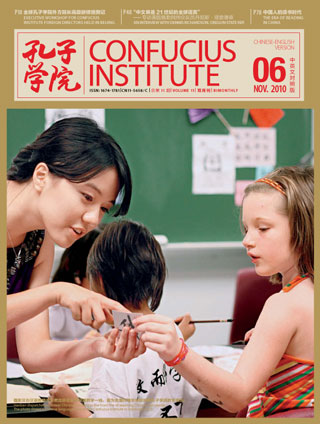

“I teach chinese on the East African Plateau”
Wang Yuelin (Ethiopia): “Perhaps energized by appreciation of my e ffort at learning their language, the students themselves began to work even harder at Chinese”.
Currently there are over 4,000 Chinese language teachers and volunteers teaching Chinese in Confucius Institutes, primary and secondary schools and universities throughout the world. While spreading Chinese language and culture, these cultural envoys personally experienced exchanges and interactions with different teaching practices and other cultures. The column of Teachers’ Voices is a channel where Chinese language teachers and volunteers can share their teaching experience with each other. There will also be a collection of stories on their unique experiences in foreign lands these cultural envoys can share with our readers.
Wang Yuelin, teacher of Chinese at the Confucius Institute in Addis Ababa, Ethiopia
In February 2010, I came to Ethiopia to teach Chinese on this plateau in East Africa.
Ethiopians’ native language is Amharic. Although English is taught at the school, the students are far from being proficient in listening to and speaking English. To them, English and Chinese are both foreign languages. With this in mind, I decided to learn Amharic. Before each class, I memorized Amharic translations of the new words that would be covered in the class. To my surprise, when I explained new words or sentences in a language familiar to the students, they could immediately understand me and praised me with rounds of applause. Perhaps energized by appreciation of my effort at learning their language, the students themselves began to work even harder at Chinese.
I have always believed that a teacher of Chinese at Confucius Institute is not just a propagator of Chinese language, but is even more an ambassador of Chinese culture. In my class, I try to incorporate Chinese culture and customs into textbook teaching. When workbooks are handed out in class, the students always receive them with their right hand, as it is considered a sign of respect in Ethiopia to receive things with the right hand whereas using the left hand is considered disrespectful. At this time, I will say to the students: “In China, when we receive things that are being offered we usually use both hands to show respect. When you are with Chinese or have an opportunity to be in China, make sure you remember this.” In a class session about foods, I introduced Chinese chopsticks. Since there are very few Chinese restaurants in Ethiopia, the students hardly have any chance to eat Chinese food. So, their knowledge of chopsticks amounted to almost zero. When I asked them, “What are these?” they all answered with one voice: “Little sticks.” The students had never really seen chopsticks before. However, after I demonstrated how to use chopsticks, it didn’t take them long to learn to skillfully handle these little sticks. In their excitement, the students all used chopsticks to try picking up pens and pieces of paper. At this point, I stuck onto the blackboard some Post-It notes I had prepared; on each was written a new word that had just been covered in class. I then divided the class into two groups, so that when I read out a word, one group would send to the front a student who would pick off the corresponding Post-It note. Th e students showed a lot of interest in this new exercise. In the past, when I used straightforward questioning, some students would simply try to avoid being questioned. This new, game-like word exercise gave students chances to show themselves in front of the others and gave them a deeper impression of the words that they had picked. After I had pronounced 12 words and the results were known, the losing group performed a chorus for the class, singing the beautiful Chinese song, e Jasmine Flower.
As a semester quickly came to an end, I had formed a strong friendship with these dear students. Every Chinese sentence they have learned is a tremendous encouragement to me. Now that they can use Chinese to communicate with Chinese people, I feel more confident in my ability to teach Chinese well.
 Published in Confucius Institute Magazine
Published in Confucius Institute MagazineNumber 11. Volume VI. November 2010.
View/Download the print issue in PDF










.png)













No hay comentarios:
Publicar un comentario